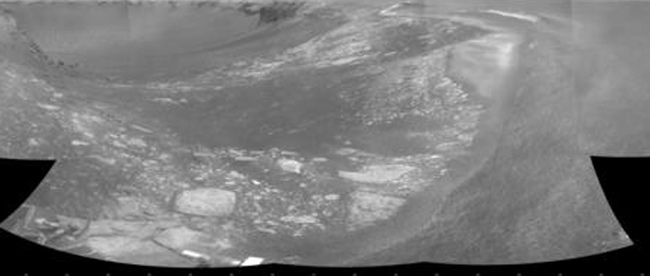Mars Rover to Enter Giant Crater

LOS ANGELES (AP) -- Two months after surviving a giant dust storm, one of NASA's robotic rovers on Mars began a risky drive Tuesday into a crater blasted open by a meteor eons ago.
Scientists want the rover Opportunity to travel 40 feet down toward a bright band of rocks in the Victoria Crater. They believe the rocks represent the ancient surface of Mars and that studying them could shed clues on the planet's early climate.
On Tuesday morning, engineers sent commands to Opportunity to begin its journey, and the robot signaled a confirmation. It will be several hours before scientists know how well the drive is going, and the trek itself will take several days.
Opportunity's first task will be to "toe dip'' into the crater, a move that involves rolling its six wheels below the rim and immediately back out to gauge its footing.
Over the next few days, engineers will check Opportunity's instruments and command it to scale down the crater.
"We expect to have good driving,'' said John Callas, the rover project manager at NASA's Jet Propulsion Laboratory in Pasadena.
The long-awaited descent into the crater -- measuring a half-mile across and about 200 to 230 feet deep -- had been on hold since July when a series of sun-blotting dust storms raged in the southern hemisphere. At the height of the storm, Opportunity and its twin, Spirit, went into sleep mode to conserve energy. Spirit is exploring another area far from Opportunity.
Breaking space news, the latest updates on rocket launches, skywatching events and more!
Opportunity reached the lip of the crater last month and scouted for possible entry points. The route scientists eventually chose calls for a straight drive down at a 15-degree incline toward the exposed layer of bright rocks.
During a July teleconference, NASA managers admitted the latest mission was risky, but decided to proceed anyway because of the science that could be learned.
The aging but hardy rovers have been exploring Mars for 3 1/2 years -- far outlasting their primary, three-month mission.
- Top 10 Mars Rovers' Most Amazing Discoveries
- VIDEO: Mars Rover Team Ponders Mission's End
- Complete Coverage of the Mars Rovers
Alicia is a former contributing writer for Space.com working in the areas of Space Exploration and Human Spaceflight. She's currently a health and science editor for The Associated Press in New York, where she's been employed since 2017. She's a 2018 Tow-Knight entrepreneurial journalism fellow at the CUNY Graduate School of Journalism and was a 2015–16 Knight Science Journalism fellow at the Massachusetts Institute of Technology.
